

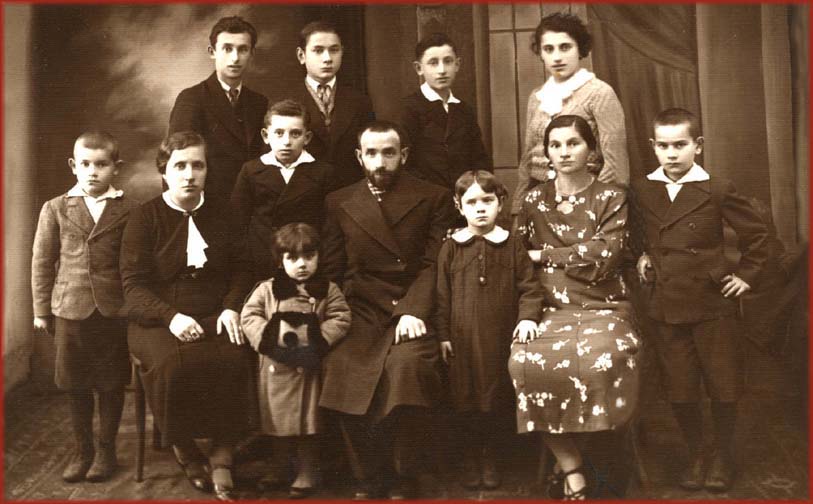
THE PTAK AND NORTMAN FAMILIES (Vengrov, 1935)
Front row (l-r): Nortman son, Tsivya Nortman Ptak, Pesach Ptak, Chaim
Nortman, Nortman daughter, Mrs. Nortman, Nortman son. The little girl with
the muffler is Srul Usha Ptak's daughter (granddaughter of Tsivya Nortman
Ptak). Back row: Leibl Ptak, Chiel Nortman, Rivim Ptak, Chaika Ptak.
The Nortmans remained in Vengrov and were murdered in the Holocaust.
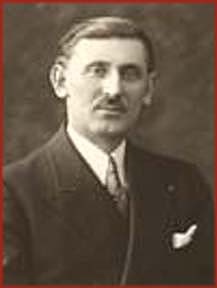
Harry (Hersh Isak) Ptak (New York, ca. 1934)
For eight years (from 1928 to 1936), my father Hersh Isak (Harry) Ptak lived in New York without his family, as a boarder in someoneís apartment. It was during the Depression and he worked hard and saved his money until he had scraped up enough to send us tickets to come to America. My two older half-brothers, Moishe and Srul Usha (Sol), had already married in Vengrov and had no interest in coming to America at that time. A few years later, in 1939, just before World War II broke out, Sol came here by himself. He was hoping to find a better life and to earn the money to bring over his wife and two little children. He had left them in Vengrov, to a fate no one could have anticipated, because they died in the Holocaust. You can imagine the nightmares that Sol had.
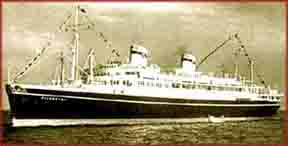
The SS Pilsudski, the ship that
brought the Ptaks to America
We traveled from Vengrov to Warsaw and then to the port of Gdynia. We boarded the SS Pilsudski, for a difficult journey that took about two weeks. The North Atlantic was so rough that we all got very sick. I was in the shipís hospital almost the whole trip. I remember getting a bath for the first time and eating food that I didnít know existed. We arrived at Ellis Island and were picked up in a car by a landsman, a friend from the old country. It was my first time in a car. That day turned my life around. New things happened at such a fast pace that I was bewildered. It was November 25, 1936, Thanksgiving Day.
We went to an apartment on the Lower East Side that my father had rented, at 540 East 5th Street. It was on the third floor of an old walk-up and had four small rooms, two of which were bedrooms. We had an ice box, a sink with running water in the kitchen, an indoor flushing toilet, and a shower. It was a big step up from Vengrov and, because we didnít know any better, we thought that this was real luxury.
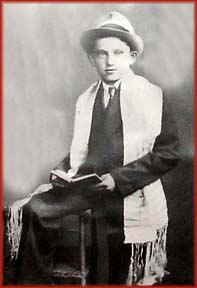
Paul (Pesach) Ptak becomes a bar mitzvah
(New York, 1939)
My sister Clara and brother Leo had left many friends in Vengrov and they were very homesick. So was my brother Ruby, who was 13 and did not speak any English. I was only ten years old and I had little trouble adjusting. I immediately found kids my age playing stick ball, punch ball, and box ball in the street. Within a few months, I had learned English and I thrived. I was put into first grade with kids three or four years younger, but was in my own grade level only two years later, with kids my own age. There were Polish, Italian, Russian, and Jewish kids on our block, but we all were friends because we had important things in common: we loved hanging out and playing ball and we were all poor.
World War II changed everything. All four of us boys (Sol, Leo, Ruby, and I) were drafted. It was very hard on my mother and father. He read the Jewish paper, the Forward, every day and followed events during the war, but he never spoke about it. Sol and Ruby wound up in the European war against Hitler, and Leo and I ended up in the Pacific, fighting against Japan. Ruby almost got captured during the Battle of Bastogne, but was saved when General George Patton broke through the German lines and rescued the encircled American Army. Leo had the toughest five years of his life. He was in the infantry and fought on the islands of Saipan and Okinawa, with the famous Fighting 69th Division of the Army. I was a Navy Seabee and I was in Okinawa right after we invaded it.
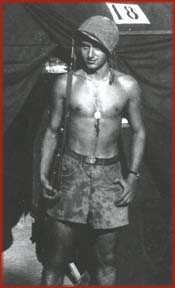
Paul Ptak (Okinawa, 1945)
It was only after we got home that we learned about the Holocaust, one of the most horrific events of the 20th century, if not the most devastating event of all time. Anti-Semitism had always been prevalent in our part of the world, especially in Russia and Poland. I lost many relatives and friends that I knew as a child in Poland, whose faces I still see in my mind and cannot forget --- my brother Moshe and his family, my brother Sol's wife and children, my mother's brother (my uncle) Chaim Nortman and his family, and so many others. It was pure luck that we got out in time. For that I thank God and my father, to whom we all owe our lives and eternal gratitude for bringing us to America.

Paul Ptak (2007)
For Paul Ptak's memoir about life in Vengrov, click here.
Credits: Text and photographs copyrighted © 2008 by Paul Ptak. Text edited and page designed by Helene Kenvin. Page created by Helene Kenvin. All rights reserved.